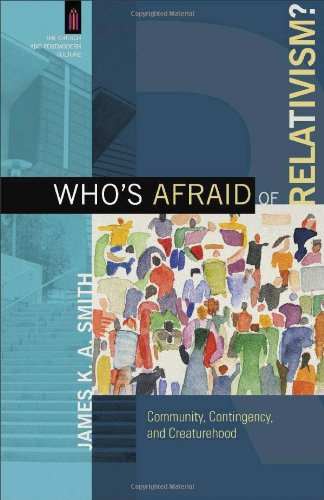 James K.A. Smith vom Calvin College in Grand Rapids (Michigan, USA) ist bekannt für seine Sympathien mit dem postmodernen Denken (siehe meine Kritik hier). In seinem neuen Buch Who’s Afraid of Relativism? empfiehlt er den philosophischen Relativismus bzw. Pragmatismus.
James K.A. Smith vom Calvin College in Grand Rapids (Michigan, USA) ist bekannt für seine Sympathien mit dem postmodernen Denken (siehe meine Kritik hier). In seinem neuen Buch Who’s Afraid of Relativism? empfiehlt er den philosophischen Relativismus bzw. Pragmatismus.
James Anderson hat das Buch gelesen und einige Schwächen benannt:
James K. A. Smith’s latest book continues his longstanding project of sympathetic Christian engagement with postmodernist philosophy. On this occasion Smith, professor of philosophy at Calvin College in Grand Rapids, Michigan, seeks to play the role of defense attorney for “relativism”; more precisely, the philosophy of pragmatism as propounded by the controversial American philosopher Richard Rorty. His central thesis is repeated in different forms throughout the book: pragmatism is a philosophy centered on the recognition of our dependence, finitude, and contingency; thus Christians, who acknowledge the dependence, finitude, and contingency of the creation, should be sympathetic rather than hostile toward pragmatism. But embracing pragmatism also means repenting of representationalist realism: the idea that truth consists in a correspondence or match between the “inside” world of our thoughts and the “outside” world of objects existing independently of our thoughts.
The opening chapter sets up the problem Smith seeks to solve—or rather to subvert. Christians fear “the specter of relativism” because they think Christianity requires a commitment to “absolute truth,” which relativism repudiates. Relativism and its defenders are therefore enemies of the Christian faith. The term “relativism” is often poorly defined and has been used to label various views, some more vulnerable to refutation than others. Rather than deal with sophomoric types of relativism (“true for you, not true for me”) Smith proposes to engage with a serious and sophisticated form of relativism, namely, contemporary pragmatism.
Hier mehr: thegospelcoalition.org.
Ein weiteres Buch, das verdient, ganz pragmatisch igoniert zu werden …
@schandor: Niemand zwingt dich gute Bücher zu lesen. 😉 J K A Smith‘ Buch ist Teil einer Serie (quasi fast schon Fliessbandarbeit, wenn man seinen Output anschaut), die sich mit etlichen postmodernen Strömen auseinandersetzt und zwar nicht anbiedernd, aber auch nicht sofort allergisch-ablehnend. Smith sitzt nicht wie das Kaninchen vor der Schlange, sondern zeigt mehr oder weniger in jedem dieser Bücher: „Entspannt euch, die kochen auch nur mit Wasser. Keine Angst vor der Postmoderne!“ Da ist sogar oft ein wenig Polemik gegenüber den aktuellen Philosophien mit im Spiel. Und so ähnlich schätzt ja auch Andersen das Buch letztendlich ein: „… the book is mistitled. Instead of asking “Who’s Afraid of Relativism?” it should be asking “Who’s Afraid of Relativity?” But the answer to that question is: hardly anyone. Such a title would have been more appropriate but far less provocative and interesting.“ Alles in allem wäre es wünschenswert, es würde mehr Theologen wie J K A Smith geben, die diesen… Weiterlesen »
@mark.us:
Eben gerade nicht. Smith steht dafür, die Leute und die Ideen, an die er sich anbiedert, falsch darzustellen. Schlichten Populismus darf man so etwas nennen.
Liebe Grüße, Ron
Das sehe ich mit Anderson anders: 😉
„There is much to admire about Smith’s sympathetic interaction with these postmodern thinkers. Such writers have important insights that can expose our unwitting deference to modernist epistemologies and illuminate various aspects of Christian faith and practice. His overall project is a worthy and worthwhile one. „
Und falsch.
Liebe Grüße, Ron
Zu Papier gebrachte Gedanken sind überhaupt nichts weiter als die Spur eines Fußgängers im Sande: man sieht wohl den Weg, welchen er genommen hat; aber um zu wissen, was er auf dem Wege gesehn, muß man seine eigenen Augen gebrauchen (Schopenhauer).
Der Relativismus ist immer falsch. Das steckt schon in seinem Namen. Ein Theologe, der sich diesem Unsinn anbiedert, verdient seinen Namen nicht. Ich spreche ihm daher ex cathedra und im Namen der Wahrheit den Titel eines Theologen ab.
@Schandor,
da bin ich ganz Ihrer Meinung. Wenn die Aussagen des Judentums, Christentums o. einer anderen Religion „relativ“ sind, dann schaffen sich diese Religionen selbst ab; denn damit schneide ich mir den Ast auf dem ich sitze selbst ab.
Ich habe mich schon immer darüber aufgeregt, wenn behauptet wird, dass der Mensch aus „nichts, als“ aus Zellen und vor allem Wasser besteht. Welch`erbärmliche Definition. Der Mensch ist sehr viel mehr, auch wenn das, was sein Geist hervorbringt, nicht immer ruhmvoll ist.